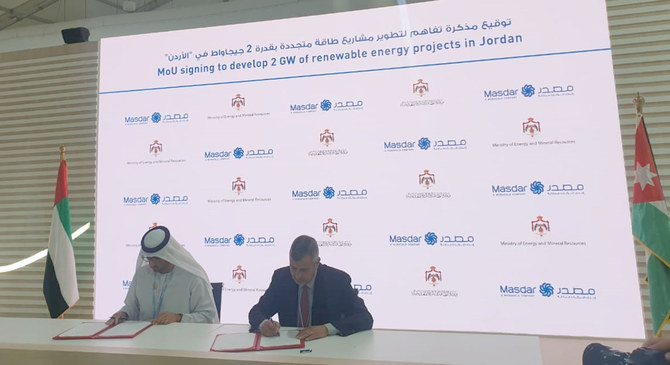AMMAN: Jordanian Minister of Energy Saleh Kharabsheh and UAE Minister of Industry and Advanced Technology Sultan Al-Jaber signed a memorandum of understanding on Wednesday to collaborate in renewable energy.
The agreement was signed on the sidelines of COP27 held in Sharm El-Sheikh, Jordan News Agency reported.
It outlines research cooperation for investment opportunities in wind energy projects, an exchange of experiences and technology in green energy, the launch of qualification and training programs for Jordanian experts and engineers, and the establishment of green energy scholarships between Jordanian and UAE universities.
Kharabsheh said that Jordan’s partnership with the UAE and Masdar, the UAE’s government-owned renewable energy company, supports its efforts to reduce greenhouse gas emissions by 31 percent.
Al-Jaber stated that the agreement highlights Jordanian-Emirati ties and that Masdar is making every effort to assist neighboring countries in their energy transition journeys.
Masdar CEO Mohammed Al-Ramahi stated that the company has been a significant partner of Jordan for nearly 10 years and expressed hope that this agreement will deepen Jordan’s cooperation in renewable energy.
Jordan’s energy generated from total installed renewable energy capacity topped 5.5 terawatts/hour by the end of 2021, placing Jordan first in the region on the installed capacity of renewable energy sources rate, excluding hydropower.
Furthermore, by July 2022, approximately 29 percent of electricity generated was from renewable energy sources, and total installed capacity of renewable energy generation projects reached approximately 2,526 megawatts.
Kharabsheh emphasized the ministry’s commitment to increasing the rate to 50 percent by 2030 and making Jordan a regional hub for green energy by “leveraging the abundant sustainable sources and the central location of Jordan in the Middle East and North Africa.”
















